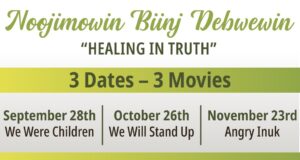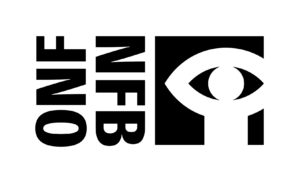Announcing Noojimowin Biinj Debwewin – “Healing IN Truth” – a three-part documentary film series presented in the Fall of 2021 to raise public awareness of injustices committed against Canada’s Indigenous Peoples. Each screening is followed by a panel discussion between survivors, knowledge-keepers and documentary makers to help both educate viewers and present paths to healing, reconciliation and prevention. Join us for these powerful, impactful and life-changing narratives as truth is given a voice and healing can begin as that voice is heard.
“Angry Inuk”
Angry Inuk can be viewed in its entirety on Amazon Prime or Click HERE to view part of the film on Youtube and then return to this page and click on the video immediately below to watch an interview with Aaju Peter
Movie #3 – Nov 23rd – Angry Inuk Warning: this film contains graphic content and is recommended for audiences 16 years of age and older.
Alethea Arnaquq-Baril In her award-winning documentary, director Alethea Arnaquq-Baril joins a new tech-savvy generation of Inuit as they campaign to challenge long-established perceptions of seal hunting. Armed with social media and their own sense of humour and justice, this group is bringing its own voice into the conversation and presenting themselves to the world as a modern people in dire need of a sustainable economy.
Interview with Aaju Peter:

Movie #2 – nîpawistamâsowin: We Will Stand Up Tasha Hubbard Warning: this film contains graphic content and is recommended for audiences 16 years of age and older. On August 9, 2016, a young Cree man named Colten Boushie died from a gunshot to the back of his head after entering Gerald Stanley’s rural property with his friends. The jury’s subsequent acquittal of Stanley captured international attention, raising questions about racism embedded within Canada’s legal system and propelling Colten’s family to national and international stages in their pursuit of justice. Sensitively directed by Tasha Hubbard, nîpawistamâsowin: We Will Stand Up weaves a profound narrative encompassing the filmmaker’s own adoption, the stark history of colonialism on the Prairies, and a vision of a future where Indigenous children can live safely on their homelands.
Helpful online links and resources also on this page, including the NFB WWSU Learner’s Guide and WWSU Community Engagement Guide.
Introduction by Carol (Brant) Cologna:
Closing remarks and next film title/viewing date:
Online resources & links:
– NFB We Will Stand Up Learner’s Guide
– We Will Stand Up Community Engagement Guide
– Family Resources will be available on the website in the near future.
– nîpawistamâsowin facebook page @WeWillStandUpfilm
– There is also an education/learning guide for the film. Accessible on the NFB link once signed in.
– “Storying Violence: Unravelling Colonial Narratives in the Stanley Trial” By Gina Starblanket & Dallas Hunt
– Project Fact(a) publications:
– Canadian Bar Review: Vol 98 No 2 (2020): Special Issue on the R v Stanley Trial

Movie # 1 – We Were Children
Warning: this film contains disturbing content and is recommended for audiences 16 years of age and older. Parental discretion, and/or watching this film within a group setting, is strongly advised. If you need counselling support, please contact Health Canada.
In this feature film, the profound impact of the Canadian government’s residential school system is conveyed through the eyes of two children who were forced to face hardships beyond their years. As young children, Lyna and Glen were taken from their homes and placed in church-run boarding schools, where they suffered years of physical, sexual and emotional abuse, the effects of which persist in their adult lives. We Were Children gives voice to a national tragedy and demonstrates the incredible resilience of the human spirit.
Brought to you in partnership with the National Film Board of Canada, Suzanne Smoke and Biindigen Healing and Arts, and Abuse Hurts. Sponsored by Torkin Manes.
“We Were Children” Sponsor:

